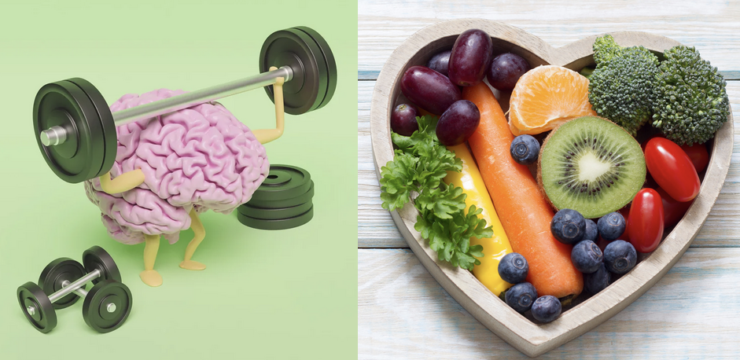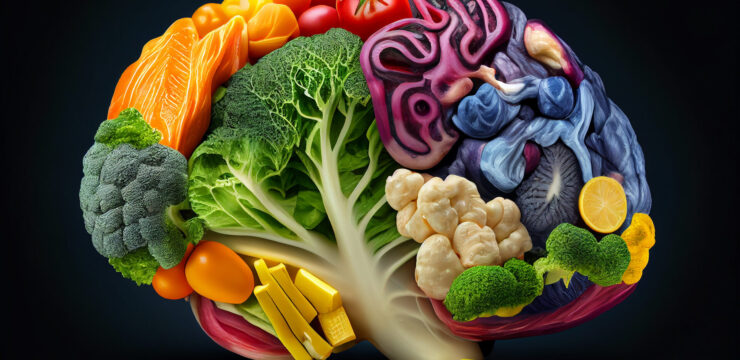When we think about nutrition, the first thing that often comes to mind is how it affects our physical health—helping us maintain a healthy weight, giving us energy, and boosting our immune system. However, what many people don’t realize is that what we eat plays a critical role in our mental health as well. There’s an emerging body of research that highlights the strong connection between our diet and our mind, showing that nutrition can have a profound effect on everything from mood regulation to cognitive function.
In this article, we will explore how nutrition influences mental health, the nutrients your brain needs to function optimally, and the steps you can take to improve your mental well-being through diet.
The Brain and Nutrition: A Vital Connection
The brain is one of the most energy-demanding organs in the body, consuming about 20% of the body’s energy despite only accounting for around 2% of our total weight. It requires a steady supply of nutrients to function at its best. What we eat affects our brain’s structure and the chemical processes that take place in it. Key nutrients help regulate neurotransmitters, which are the brain’s communication system that influences mood, emotions, cognition, and behavior.
Just like any other part of the body, the brain needs fuel to work properly. And when it doesn’t get the right fuel, mental health can suffer. Poor nutrition can contribute to the development of various mental health conditions, including depression, anxiety, and cognitive decline.
Key Nutrients for Mental Health
- Omega-3 Fatty Acids
These essential fats, found in fatty fish like salmon, mackerel, and sardines, as well as flaxseeds and walnuts, have been linked to a reduction in symptoms of depression and anxiety. Omega-3s are crucial for brain health as they help to maintain the structure of brain cells and are involved in the transmission of signals between them. Research has shown that individuals with lower levels of omega-3s are more likely to experience mental health challenges.
- B Vitamins (B6, B12, and Folate)
B vitamins play a significant role in brain function by supporting neurotransmitter production and promoting overall brain health. Vitamin B6, for example, is necessary for the production of serotonin, the “feel-good” neurotransmitter. Low levels of B12 and folate have been associated with an increased risk of depression and cognitive decline. Sources of B vitamins include leafy greens, legumes, eggs, and fortified cereals.
- Vitamin D
Often referred to as the “sunshine vitamin,” vitamin D is critical not only for bone health but also for mood regulation. Vitamin D receptors are found in areas of the brain that control emotions, and low levels of vitamin D have been linked to an increased risk of depression and seasonal affective disorder (SAD). Natural sources of vitamin D include fatty fish, fortified dairy, and exposure to sunlight.
- Magnesium
Magnesium is involved in more than 300 biochemical reactions in the body, including those that affect the nervous system. Studies suggest that magnesium deficiency may contribute to symptoms of depression and anxiety. Foods high in magnesium include dark leafy greens, nuts, seeds, and whole grains.
- Amino Acids (Tryptophan and Tyrosine)
Amino acids are the building blocks of proteins, and some of them are essential for producing neurotransmitters like serotonin and dopamine. Tryptophan, found in turkey, eggs, and dairy, is a precursor to serotonin, which helps regulate mood and sleep. Tyrosine, found in lean meats, dairy, and soy products, is involved in dopamine production, a neurotransmitter linked to motivation and reward.
- Probiotics and Gut Health
The gut-brain connection is another emerging area of research, with studies suggesting that a healthy gut can have a positive impact on mental well-being. The gut is home to trillions of bacteria, and imbalances in this microbiome have been associated with conditions like anxiety and depression. Fermented foods like yogurt, kimchi, and kefir, as well as prebiotic-rich foods like bananas and onions, can help maintain a balanced gut microbiome and potentially improve mood.
The Impact of a Poor Diet on Mental Health
While nutrition has the power to heal and enhance mental health, poor dietary habits can have the opposite effect. Diets high in processed foods, sugar, and trans fats may disrupt the brain’s chemistry, leading to mood swings, irritability, and even mental health disorders. Chronic consumption of refined sugars can cause blood sugar imbalances, which are linked to increased stress levels and anxiety.
A diet low in essential nutrients can leave the brain vulnerable to oxidative stress and inflammation, both of which have been implicated in the development of mood disorders and cognitive decline. Lack of sleep, dehydration, and poor gut health—often the result of an unhealthy diet—can further exacerbate mental health challenges.
Practical Tips for a Brain-Boosting Diet
- Eat a Rainbow of Foods
Fruits and vegetables provide a wide range of vitamins, minerals, antioxidants, and fiber that support brain health. Aim to include colorful, nutrient-dense options in your meals to ensure your body is getting a variety of essential nutrients.
- Prioritize Whole Foods
Minimize processed foods and focus on whole foods that are rich in nutrients. Whole grains, lean proteins, healthy fats, and fresh produce should make up the majority of your diet to ensure your brain gets the nutrients it needs to function optimally.
- Incorporate Healthy Fats
Include sources of healthy fats such as avocados, olive oil, nuts, and fatty fish. Omega-3-rich foods, in particular, support brain function and may help reduce inflammation that affects mood.
- Hydrate
Dehydration can lead to irritability, brain fog, and difficulty concentrating. Make sure to drink plenty of water throughout the day to stay hydrated and keep your brain functioning at its best.
- Limit Processed Sugars
Excessive sugar consumption can negatively affect your mental health. Try to limit your intake of sugary snacks, sodas, and processed foods, and opt for natural sweeteners like honey or fruit when possible.
- Include Probiotics and Prebiotics
Support your gut health by including probiotics like yogurt, kefir, and fermented vegetables, as well as prebiotics like garlic, onions, and asparagus. A healthy gut microbiome is essential for good mental health.
Conclusion
The mind-body connection is a powerful one, and nutrition plays a pivotal role in shaping our mental health. By fueling the brain with the right nutrients, we can support cognitive function, regulate our emotions, and protect against mental health disorders. Incorporating a variety of nutrient-dense foods into your diet can help ensure that your brain has the fuel it needs to thrive. So, the next time you think about what’s on your plate, remember: what you eat doesn’t just shape your body—it shapes your mind as well.


